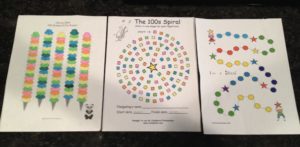Some colleagues and clients are at first surprised when they find out my undergraduate degree was in Music Performance and Pedagogy. If you’re not familiar with music school requirements, you might think that sounds like an easy, fun major. Easy, no. And fun only if you like to spend hours locked up in a practice room. I confess that one of the reasons I switched from piano as my major instrument to voice was that I noticed the piano majors routinely spent 6–8 hours a day in the practice room, while, in order to protect their voices, singers rarely practiced more than 2-3 hours a day by themselves. (We made up for it by learning multiple languages, acquiring acting and dance skills, additional piano practice, and lots and lots of ensemble practice! In the end, regardless of the specific musical path, one couldn’t avoid putting in practice time!)
You’ve probably heard the “10,000 hours rule,” a theory popularized by Malcolm Gladwell, which claims that it takes 10,000 hours of practice to become an expert in any field. Of course, just putting in the hours won’t necessarily do it. It’s important to invest your practice hours well.
Want to improve your skills? Here are 10 things I first learned about effective skills practice as a musician that apply in any field:
- Practice for results. Know what you are aiming for—both today and in the longer term. Keeping a long-term purpose or goal in mind helps you maintain the motivation to persist through the daily hard work. A specific daily action goal provides focus, accountability, and momentum to keep moving forward. Think of your long-term purpose or goal as your destination, and the daily actions goals as the steps you must take along the path. Today I will (specific, measurable, achievable action goal) so I’ll be prepared to (long-term goal.) Give yourself check-points along the way to evaluate your progress and results.
- Practice mindfully. Don’t just go through the motions. Practice with good technique, because “practice makes permanent.” Focus your attention. Don’t drift.
- Work with a good teacher. You’ll make faster progress with an experienced, skilled guide at your side. They can help you recognize your strengths, determine what to work on, and develop good skills and technique. They may also be able to assist you in finding additional resources and opportunities to apply your skills. (Note: The best performer is not necessarily the best teacher. Look for someone who “gets you,” has both good subject matter skills and teaching skills, and loves to help others develop their talents.)
- Practice the building blocks. Learn the underlying principles and foundation skills well. (For instance, for a singer, this would be breathing technique. For an instrumentalist, scales and chord patterns. For a salesperson, asking good questions, deep listening, matching needs with product benefits.) Work on one or two sub-skills or small improvements at a time until they become natural and effortless; then combine them. Depending on the skills, you might try switching the sequence to avoid mindless repetition and to simulate how they would be used in real-life situations.
- Practice consistently. Unfortunately, “cramming” doesn’t work over the long haul for acquiring either knowledge or skill. We learn best with consistent, regular review, practice, and testing. Don’t just “try” to fit practice sessions in. Schedule them. If something tries to interfere, question it. If you find you must forgo your planned time, reschedule it. If you’re serious about improving, do what it takes to get yourself to practice. Usually the hardest part is getting started. Most of us need a little something to jumpstart our motivation—a ritual, a game, an accountability buddy, the incentive of little rewards along the way, a deadline. If you have scheduled a performance or promised a deliverable, you’re more likely to get going!
- Practice the hard parts. It’s easy to fall into the trap of thinking you are practicing by going over and over the parts or skills you already know and can do well. There is a place for review, but real progress will depend on your success in addressing what you don’t already have down. Break down challenging sections into small chunks to practice separately. Or identify sub-skills to work on. Isolate them. Improve the skill or technique. Drill it. Then recombine with other parts or skills in context.
- Learn to recognize when you’re “doing it right.” The best teachers and coaches will help you learn to evaluate yourself accurately. Know what good technique looks and sounds like. (You might have to record yourself and play it back to be able to see and hear as your audience will.) Learn to evaluate the activities and measure the results that count.
- Give yourself the right amount of challenge. Make sure your goals are big enough. It may be comfortable to be comfortable, but we actually do better when solid effort is required. The best place to be is where you are stretched, but not stressed. “Play up.” Your growth will be much faster if you play with people who are a little better than you currently are, who work hard, and who inspire you.
- Give yourself a reward. Make your practice interesting. Make it a game. Track and celebrate your progress. {I still use music teacher practice charts to record exercise and other activities that require regular practice. Even as an adult, I find it satisfying to color in the chart and have a visual record of my effort.)

I swam 62 miles last summer!
- Test it out. Now that you’ve practiced under controlled conditions, put it all together and test yourself under the actual conditions under which you’ll perform. For example, your actual performance might require adjustment due to acoustics, or the ability to tune out crowd noise or other distractions. If possible, do a “dress rehearsal” to knock the bugs out and get some useful feedback.
Oh, one more thing: You’re never “done.” We can always be better. Reaching a new level allows you to see the next one. Celebrate your progress, but keep moving forward. Don’t fool yourself into thinking that you don’t need to practice just because you are experienced and have been successful. When allowed to “rust,” skills tend to decay. Additionally, your competitors won’t be resting; the bar will continue to be raised.
Enough from me. Time to get to work!
©New Century Leadership LLC 2017



 Jane Moyer heads talent development firm New Century Leadership LLC as executive coach, workshop leader, and speaker. She is author of Leaders Lab: 66 Ways to Develop Your Leadership Skill, Strategy, and Style.
Jane Moyer heads talent development firm New Century Leadership LLC as executive coach, workshop leader, and speaker. She is author of Leaders Lab: 66 Ways to Develop Your Leadership Skill, Strategy, and Style.